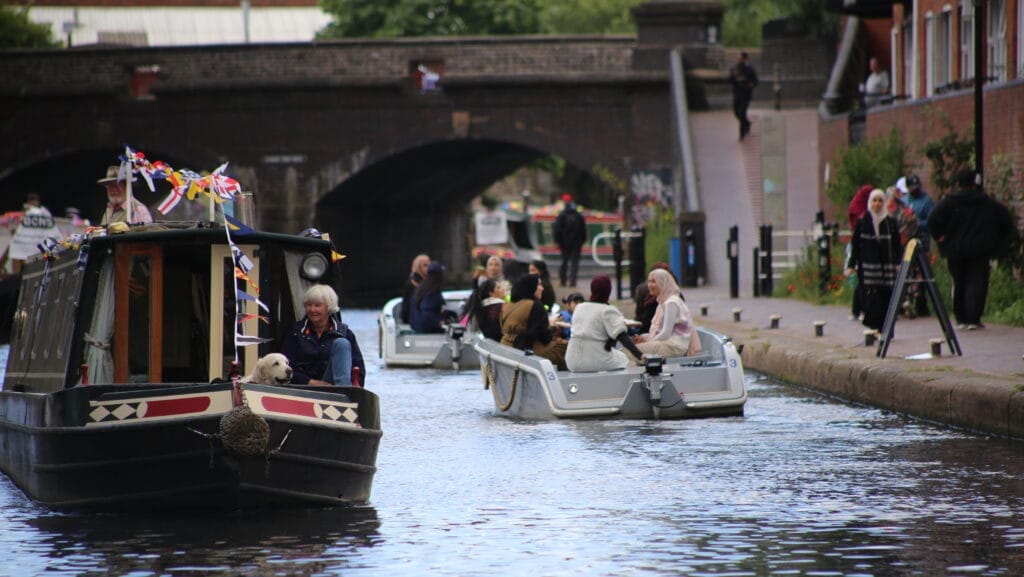
Historic canals repurposed to address modern UK’s challenges

A new report highlights how the UK’s historic canal network, originally a product of the Industrial Revolution, is being adapted to tackle key contemporary issues. These interconnected waterways, rich in biodiversity, are contributing to efforts addressing the biodiversity crisis, improving public health, and mitigating some effects of climate change.
The Canal & River Trust, a charity responsible for maintaining 2,000 miles of canals across England and Wales, has released an Impact Report demonstrating the ongoing relevance of these waterways. The report also details the challenges posed by the ageing infrastructure and the organisation’s efforts to preserve and enhance the UK canal network.
The report underscores the role of canals as significant habitats supporting biodiversity. The network includes 304 conservation areas, 68 sites of special scientific interest, and numerous biodiverse corridors that act as ‘nature highways’, enabling species to thrive and navigate the fragmented landscape. The charity has mapped the ecological footprint of its waterways, identifying their contributions to resilient ecosystems. The network flows through 32 of 48 local nature recovery strategy areas, with the charity advocating for canals to be integrated into these strategies to help reverse biodiversity loss and promote greener communities.
Access to green spaces has proven benefits for mental health, and canals provide unique blue-green environments. Over nine million people live within a 15-minute walk of a canal, and research shows that visits improve mental wellbeing by six per cent—an impact greater than green spaces alone. In areas with health and wellbeing disparities, canals offer accessible opportunities for exercise, relaxation, and nature connection. With 859m visits recorded last year, the network’s significance to communities continues to grow. Over one-third of the canal network has achieved Green Flag status, with urban areas receiving special focus.
As the effects of climate change worsen, canals are providing urban cooling, water security and flood protection. During the heatwaves of 2022, urban canals reduced temperatures by an average of 2°C in three cities. The network also supports flood defence through embankments and reservoirs, aids water security, and facilitates low-carbon transport such as cycling and walking.
Despite their value, the network faces challenges linked to ageing infrastructure. Last winter, £9m in storm damage was recorded, highlighting vulnerabilities. The Canal & River Trust is conducting over 150 critical maintenance and conservation projects this winter to address these issues and strengthen resilience against extreme weather.

The charity’s work relies on government funding, third-party contributions, public donations, and volunteer efforts. In October, the Canal & River Trust released its annual report & accounts for 2023/24, revealing a year marked by record spending on maintenance and increasing pressures on its operations due to the ageing canal infrastructure and rising costs exacerbated by climate change and inflation. These challenges come at a critical time, with the trust facing significant government funding cuts set to begin in 2027.
Last year, Fund Britain’s Waterways said government cuts will have a “devastating’ impact” in the coming years on the UK canal network.
Richard Parry, chief executive of the Canal & River Trust, says: “Our canals have been part of the UK’s story for over two centuries, and today they’re stepping up to meet the challenges of our time. Whether it’s providing vital havens and connecting corridors for wildlife, supporting mental health in our communities, or helping cities adapt to climate change, the power of canals is proving to be an irreplaceable part of our nation’s future.
“But we can’t take them for granted. The challenges facing our ageing network mean that we urgently need continued investment, public support, and partnerships to keep canals thriving and ensure they remain a vital part of modern society.”
Dr William Bird, CEO of Intelligent Health, comments: “Canals are unique spaces where nature and people come together, creating havens for wildlife that also offer a lifeline for our wellbeing. These vibrant corridors of biodiversity bring nature right into the heart of our communities, including areas where access to green space is often limited. For people living in more deprived areas, the presence of wildlife-rich canals can be transformative, providing moments of connection, calm, and inspiration that are vital for mental health. By protecting and enhancing these spaces, we’re not just supporting nature’s recovery but fostering healthier, happier communities too.”
The full impact report is available online.
The post Historic canals repurposed to address modern UK’s challenges appeared first on Marine Industry News.

